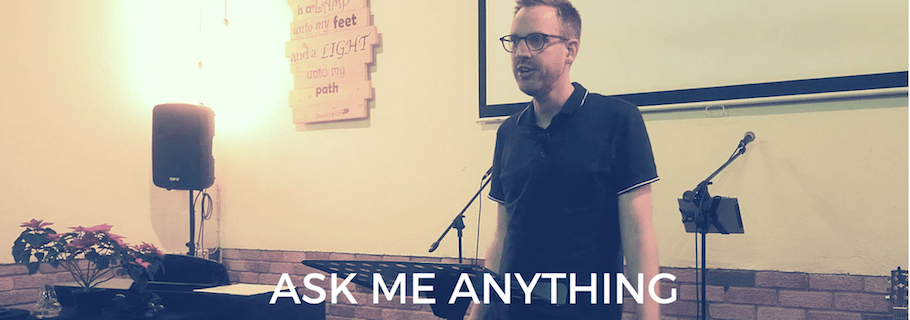At a recent event in Johannesburg, South Africa, I was asked about the relationship of churches and social media, and also asked about cell phone addiction (and information about my experiment in getting rid of my smart phone for a time). In these two videos I give my answers.
Transcript
What problems can the internet and social media cause for churches?
Problems for churches with internet and social media; I do think the gossip factor is huge. I think the, I think the over-reliance on. So, again there’s a lot of communication, I think, is far better done face to face, but it seems so convenient and so easy to do it through media and so we tend to go that way instead. You just think about the amount of things we used to do in life face to face that we now do through media. Right, we used to have to go into a bank and talk to a banker, now we just put our card in a machine and punch in our number and we get our money out, or we just do it through the internet, right. We used to have to actually talk to people face to face, now we do Facetime or we do Skype and a lot of these things are great. What is pornography, right, but putting a screen between ourselves and a sexual partner? So there’s so many things in life that we now do through a screen, through a little glowing rectangle or through a bigger computer screen. I mean, this is what we’re doing.
I don’t know that churches have thought very well about some of the costs and consequence that comes as we go way towards the convenience factor and away from the very social factor of being together, sharing space. Again, there’s so much we communicate as we talk to one another, almost all of it gets lost when we communicate through Facebook or through email which is why we developed Emoji’s and other things, right. Because when you type a sentence, I don’t know if you’re yelling it, I don’t know if you’ve got that sarcastic tone to your voice, I don’t know if you, I don’t know any of that stuff, right. But, when we speak face to face you get all of that by hearing my tone, by seeing my body language, by seeing my face. We communicate in this really holistic way. The more we drift towards media, towards social media, the more of that we lose. We try and compensate in other ways, but for now, it’s just a very one-dimensional form of communication.
So as churches lean too much on that, I think feelings get hurt, misunderstandings happen, and then there’s also the cost of just all that information being out there. Those text messages you send to people. None of the stuff ever goes away, right, nothing ever gets erased. Everything’s out there somewhere. I think we just, there’s a good call on on us to be very wise, very discreet in our communications.
How do you know if you are addicted to your phone?
Yes, so, a little ago I switched from an iPhone to a flip phone and I did that because I found that at any little crack or window in time when nothing else was going on, my completely sub-conscious action was to grab my phone and just stare at it. That felt to me like compulsive behavior and as I started thinking about it I just started changing the category. If this was alcohol instead of a phone I would say, I am deeply, deeply in bondage to drink. If it was food, I would say, I’ve really got a serious problem with food here that in any moment of empty time I’m eating. But it was my phone and I just, in my conscience, I thought, I should not be doing this. I’m supposed to be master of this device but this device owns me. Like, if I’m constantly using it, who really owns who, right? So, I realized I needed to get away from it. So, I went to the local store and for all of $49 bought a flip phone. And they thought I was crazy, which was fine with me. I bought the flip phone, put my sim card in it and used it for about three weeks before my wife said, could you please go back to your iPhone. Especially when I’m traveling, she wants to look on Find Friends and see where I am and stuff and that’s great. But, so I have switched back to my phone, but that three weeks was enough to completely modify my behavior and just show me how compulsive the use of my phone was. And I’ve not gone back to it since I switched back. So, what I found is that things like email, social media, I just had to get all of those off my phone. Even the browser, get it all off my phone, as much as I can. And, if I want to do that stuff, I’ll use an iPad or I’ll use a computer. Something that just has that little extra bit of difficulty so I can’t use it compulsively in the same way.
So, I was flying back from Orlando a couple of weeks ago and I spent two and a half hours staring at the seat ahead of me on the plane and it was an absolutely brilliant time. I just, my mind was going, I was thinking, I was praying, it was a wonderful thing because I didn’t have a little glowing rectangle to steal my attention. It really has been very, very good. Now, it’s only been a few weeks, so there’s still time for me to relapse. I’m aware of that, and I’ve got some people who are supposed to be checking up on me. But, I really feel like its woken me up to how compulsive my use is and that there really, there is something on the other side. I mean really, there’s something, if we go back in time a little to pre-iPhone days, like, there was something good about that. So, I love the iPhone, I’m especially glad to have it when I’m 13, 14000 kilometers from home, I mean it’s absolutely brilliant. But, I think it’s got too big an influence on my life and I just, I’m finding ways to own the phone instead of letting the phone own me.










